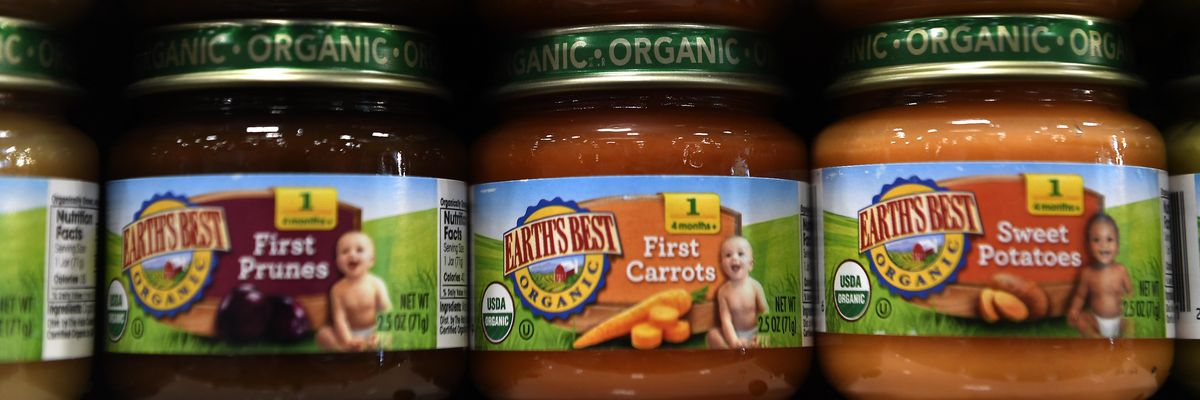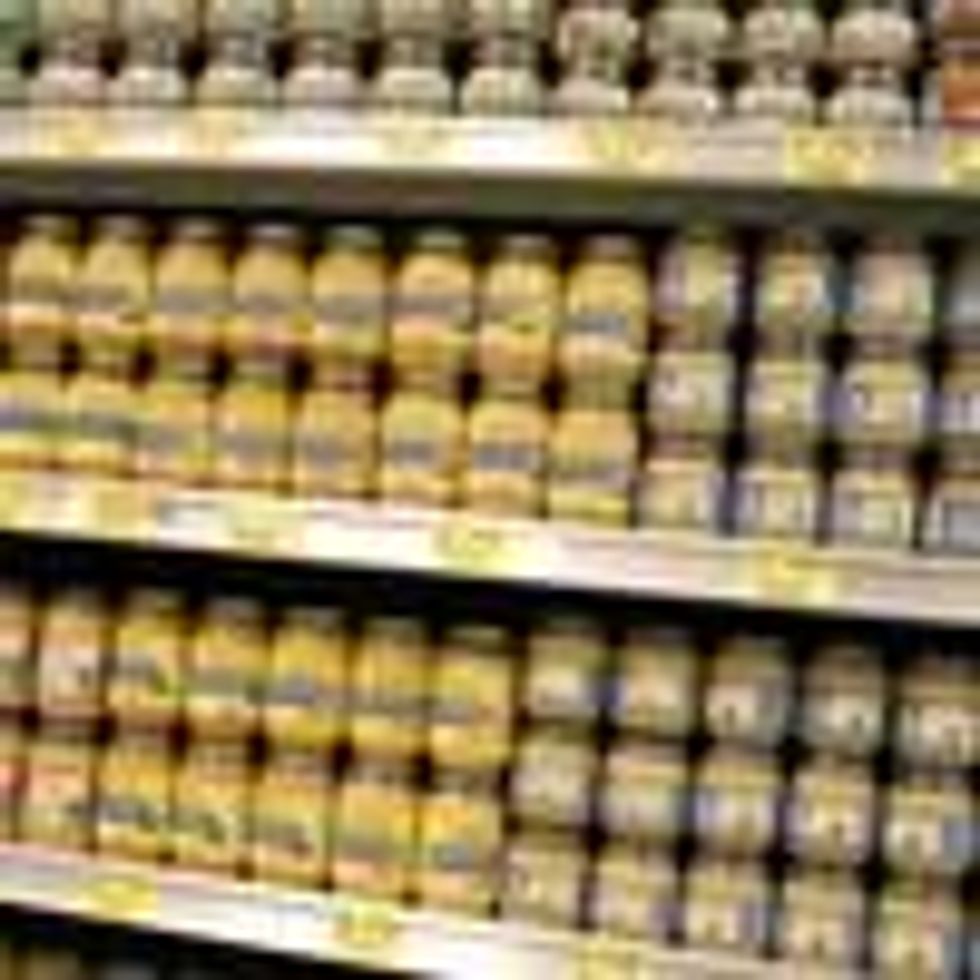Almost all of the baby foods that parents in the United States feed their children, whether purchased at the store or prepared at home, contain detectable amounts of toxic heavy metals that can impair brain development, according to new research published Thursday, which led to renewed demands for improved regulation.
"Every day that the FDA delays is another day babies' developing brains are harmed by toxic chemicals."
A previous study by Healthy Babies Bright Futures (HBBF) found that 95% of pre-packaged baby foods tested were contaminated with toxic heavy metals including lead, arsenic, cadmium, and mercury, sparking a congressional investigation and conversations about whether homemade baby foods are a safer alternative.
In an effort "to determine if homemade purees and foods purchased outside the baby food aisle have lower heavy metal levels than pre-made, store-bought baby food," the donor-funded alliance of scientists and nonprofits recently tested 288 foods and examined more than 7,000 additional food tests from published studies.
HBBF "found no evidence to suggest that homemade baby food has lower heavy metal levels than store-bought brands," lead author Jane Houlihan, the alliance's research director, and Charlotte Brody, its national director, wrote in their newly released report.
"Heavy metal levels varied widely by food type, not by who made the food," notes the analysis from HBBF, which seeks to reduce infants' exposure to damaging neurotoxins.
The alliance's key findings include:
- 94% of all food samples we tested contained detectable amounts of toxic heavy metals: 94% of store-bought baby food and 94% of homemade purees and family brand foods.
- Rice cakes and crisped rice cereal are heavily contaminated with arsenic. They contain higher levels of inorganic arsenic (the toxic form of arsenic) than any other foods tested. Both stand out as foods to avoid for children and adults alike.
- Lead, arsenic, and cadmium levels are high in some fresh carrots and sweet potatoes. We recommend that parents vary the source by choosing from different brands, varieties, or stores each week to avoid accidentally serving a high-metal source often.
- The 10 most heavily contaminated foods consumed by babies, beginning with the highest, are: rice cakes, crisped rice cereal, rice-based puffs, brown rice, rice-based teething biscuits and rusks, white rice, raisins, teething crackers (non-rice), granola bar with raisins, and oat-ring cereal.
- The 10 least contaminated foods consumed by babies, beginning with the lowest, are: bananas, grits, baby food brand meats, butternut squash, lamb, apples, pork, eggs, oranges, and watermelon.
Mark Corkins, chair of the Committee on Nutrition for the American Academy of Pediatrics (AAP), considers Thursday's study to be a logical follow-up to the one that HBBF conducted in 2019--after which many experts encouraged parents to switch to homemade options.
With the publication of its new report, HBBF has "come back and said... 'We sent shoppers into all sorts of stores, and guess what? The food you're making it from is high in heavy metals as well,'" Corkins told The Hill.
"The source is going to be the same no matter what," he continued. "It's going to be farms and produce grown in dirt and water that's the same dirt and water that the other produce is grown in."
In a statement released in response to the report, the AAP reiterated its call for "swift, comprehensive federal regulation of heavy metals in foods that babies eat."
"In the meantime," the group added, "families can reduce exposure by feeding babies a variety of foods."
Related Content
Congressional Report Reveals Manufacturers 'Knowingly' Sold Toxin-Tainted Baby Food
Kenny Stancil
The House Subcommittee on Economic and Consumer Policy revealed last February that leading baby food manufacturers are "knowingly" selling products tainted with "dangerous levels" of arsenic, lead, cadmium, and mercury--heavy metals that the U.S. Food and Drug Administration (FDA) and the World Health Organization have declared a human health hazard, particularly for infants and toddlers who are most vulnerable to their serious, often irreversible, and sometimes deadly effects.
To date, however, the FDA has set limits for heavy metals in just two types of baby food: infant rice ceral and juice. The agency's Closer to Zero plan identifies steps the agency "will take to reduce exposure to arsenic, lead, cadmium, and mercury from foods eaten by babies and young children--to as low as possible."
But as HBBF pointed out on social media, the FDA is moving at a snail's pace to take meaningful action, jeopardizing the neurological development and long-term health of countless babies.
The alliance has started a petition calling on FDA Commissioner Robert Califf to urgently "end the legal contamination of baby food" and "improve the future of our country" by moving his agency away from "business as usual."
"Parents shouldn't have to worry about the safety of their babies' meals and snacks."
"Parents shouldn't have to worry about the safety of their babies' meals and snacks," Houlihan said in a statement. "But until the FDA sets protective limits, the good news is that parents can skip and swap out certain foods to limit toxic chemical exposures."
HBBF advocates for what it calls a two-pronged "Kitchen and Country" approach.
"Until foods with reliably low heavy metal levels are widely available, parents can choose and prepare foods in ways that significantly reduce babies' exposures," states the report, which is accompanied by a two-page tip sheet for caregivers.
"The most important step," says the report, is to "introduce and serve a variety of healthy foods, whether baby food brands or homemade foods. Serving the same food every day for a long time can accidentally concentrate one or more contaminants in a child's diet. A varied diet avoids this and ensures a healthy mix of nutrients too."
But the burden shouldn't fall on parents "to navigate the risks," the report says. "FDA should establish and enforce protective limits for heavy metals in all foods consumed by babies and young children."
"Heavy metal contamination spans all the food aisles of the grocery store," the report points out. "FDA's safety standards must as well. Standards extending beyond the baby food aisle would encompass foods eaten during pregnancy as well, a crucial time for lowering toxic metal exposures."
In a statement, Brody said that "FDA's Closer to Zero program needs to live up to its name and set limits that will make the heavy metal contamination of our food much closer to zero."
"To get the levels of heavy metals meaningfully closer to zero," she added, "FDA must go beyond the baby food aisle and set strong standards for these contaminants."





